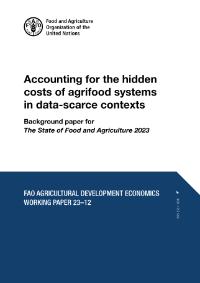Accounting for the hidden costs of agrifood systems in data-scarce contexts. Background paper for The State of Food and Agriculture 2023

13.12.2023
Anil Markandya (Basque Centre for Climate Change and Fondazione Eni Enrico Mattei)
C81, M41, M48, O57, Q18
True cost accounting, hidden costs, agrifood systems, decision-making, trade-offs, food prices
Food and Agriculture Organization (FAO) of the United Nations
FAO Agricultural Development Economics Working Papers - No. 23-12
A number of studies have estimated the hidden environmental, social and health costs associated with global agrifood systems. The methods used, as well as the data required, vary considerably from category to category. However, all studies are based on the true cost accounting approach, and demonstrate that hidden costs of agrifood systems are considerable and that action is needed at global, national and local levels. True cost accounting can facilitate improved decision-making by policymakers, businesses, farmers, investors and consumers. To apply the approach at country level, however, the methods developed must be downscaled and the data limitations overcome. This review goes through each cost category – environmental, social and health – and proposes approaches to deal with them. Where data are not available or time is limited, methods combining secondary data are suggested. In some cases, the suggestion is to collaborate with research centres, especially those working on health impacts at national level. In appraising policies and measures, account must be taken of impacts in all categories. This review identifies these and indicates which ones need special attention. A key potential tradeoff is that of the increase in the cost of food. However, there are combinations of policies that can avoid, or at least limit, these consequences. As true cost accounting expands, knowledge of what works and what does not will grow and the advice given on conducting future policy assessments will improve.
